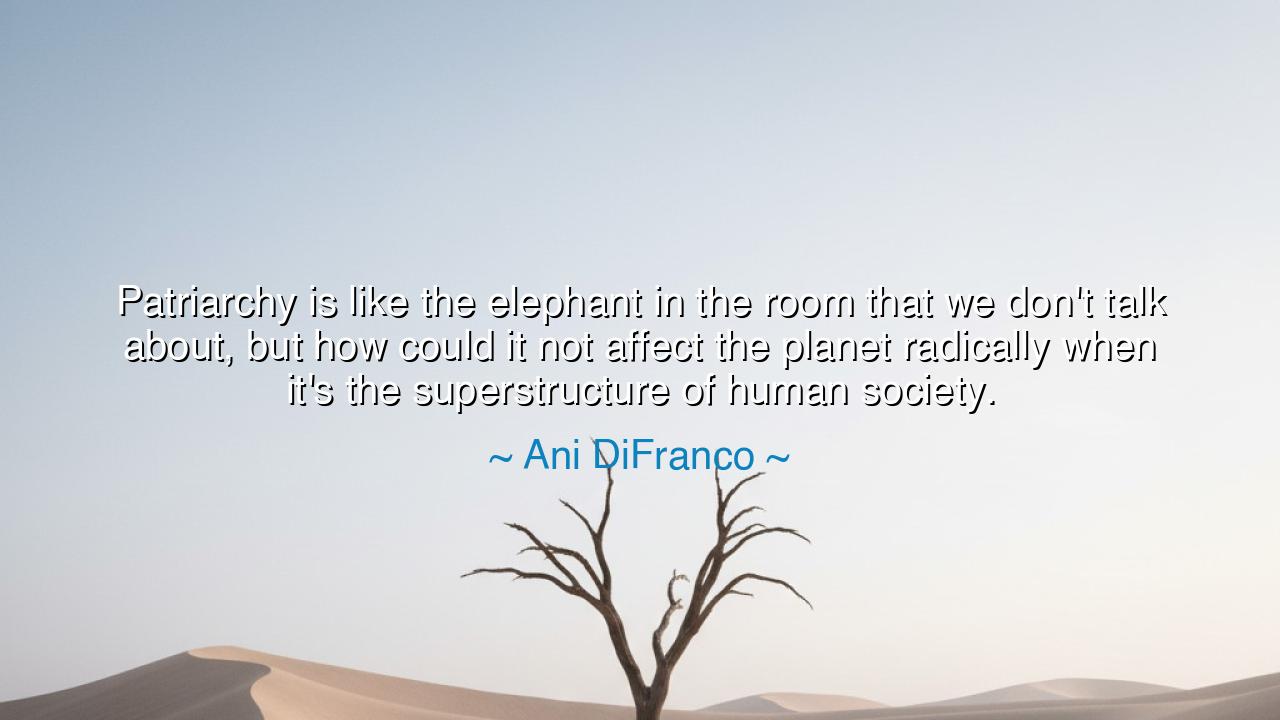
Patriarchy is like the elephant in the room that we don't talk
Patriarchy is like the elephant in the room that we don't talk about, but how could it not affect the planet radically when it's the superstructure of human society.






Hear the voice of Ani DiFranco, poet and prophet of song, who declared: “Patriarchy is like the elephant in the room that we don’t talk about, but how could it not affect the planet radically when it’s the superstructure of human society.” These words are not whispered—they thunder with truth. For she points to a power so ancient, so vast, that it hides in plain sight: the long reign of men’s dominance, woven so deeply into culture, law, and tradition that it seems invisible. Yet its effects are everywhere, shaping not only families and nations, but the very way humanity lives upon the earth.
The meaning is layered. The elephant in the room is that great unspoken presence—the structure of patriarchy, which has defined roles, silenced voices, and measured power by the scale of masculinity. It is rarely named, for naming it demands that we confront it. Yet DiFranco insists: how could such a massive force not shape the world itself? If the superstructure of human society is patriarchal, then its impact stretches beyond men and women—it permeates economies, religions, politics, even the relationship between humankind and the natural world.
The ancients left us stark examples. In Athens, often called the birthplace of democracy, women were denied the right to vote, to speak in assembly, to own property. Half of the population was excluded from the very democracy that the world reveres. This is the patriarchy as superstructure: a system so vast that even the celebrated “freedom” of Athens was built upon the silence of women and the labor of slaves. To ignore this is to ignore the truth of how civilizations are constructed—and how their greatness is bound with injustice.
Consider also the story of Wangari Maathai, the Kenyan activist who founded the Green Belt Movement. She saw how colonial and patriarchal systems had stripped women of voice and stripped the land of trees. By empowering women to plant millions of trees, she linked the fight against patriarchy to the healing of the planet. Here we see DiFranco’s point revealed: the structure of male dominance does not only silence women, it distorts humanity’s relationship to nature itself—extraction, domination, and control mirrored in both social and environmental destruction.
DiFranco’s imagery also reminds us that silence sustains injustice. The elephant in the room is immense, yet people avert their eyes, pretending it is not there. So it is with patriarchy: it survives not only because of those who wield its power, but because of those who refuse to name it. When a truth so vast remains unspoken, it becomes the invisible law of life, directing without question, ruling without resistance. Only when it is spoken aloud does the possibility of change arise.
The lesson is stern but liberating: to confront patriarchy is not to wage war on men, but to free humanity from a half-lived existence. A society that silences the voices of women silences half its wisdom. A planet governed only by domination becomes a wasteland. To ignore the elephant is to stumble blindly; to name it is to see clearly and to begin reshaping the superstructure upon which human life is built.
What, then, must we do? Speak the truth aloud, even when it is uncomfortable. Acknowledge the hidden structures that shape our homes, our laws, our economies. Uplift the voices of those long silenced. Teach our children that leadership, creativity, and wisdom belong to no one gender, but to humanity as a whole. And, like Wangari Maathai, link justice for people with justice for the earth—for the domination of one is bound to the domination of the other.
Thus remember: the patriarchy is not a shadow that disappears when ignored; it is the elephant filling the room of our history. Ani DiFranco’s words call us to see it, to name it, and to transform it. For only when we reimagine the superstructure of society can we hope to build a world where every voice is heard, every life honored, and the planet itself restored to balance.






AAdministratorAdministrator
Welcome, honored guests. Please leave a comment, we will respond soon